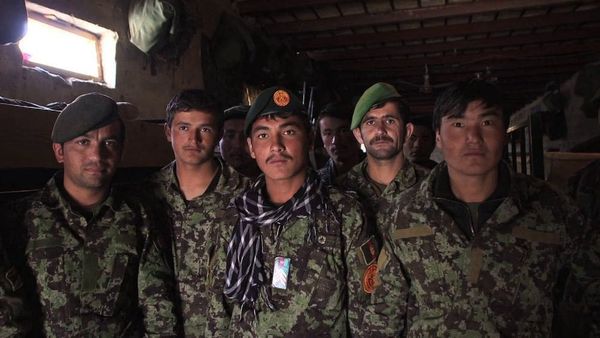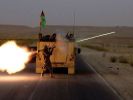Eye For Film >> Movies >> Tell Spring Not To Come This Year (2015) Film Review
Tell Spring Not To Come This Year
Reviewed by: Amber Wilkinson

With the current talk, as of December 2015, all about the situation in the Middle East and, in particular, Syria, Saeed Taji Farouky and Michael McEvoy's bleak snapshot of life in the Afghan National Army comes as a sharp reminder of the impact of 'unfinished' conflict on local populations for whom an 'exit strategy' is not an option.
The film is the brainchild of McEvoy, who had worked as a British Army liaison with Afghan forces stationed in the bloodily contested province of Helmand. Joining forces with Farouky, the two men embed themselves with the ANA 3rd Brigade in the same region, as NATO troops leave the fledgling army to take on the Taliban alone. Filming alongside the soldiers for a year, they present an intimate and troubling look at the almost impossible task faced by the ANA and the state of morale generally in the country. To personalise the story, they focus in on two soldiers in particular - officer Jalaluddin and private Sunnatullah.

Some of the issues raised by the documentary could be found in many global armies, such as the fact that the chief drivers for people to join up are not the desire to serve a country so much as a desperation to escape unemployment and poverty. "I wanted to study literature," observes Jalaluddin, who now finds himself instructing soldiers on how best to shake off fear.
As we watch the soldiers try to negotiate over opium poppy fields, a local astutely observes it wouldn't be such a problem if the government paid more for wheat, the overwhelming nature of the task at hand is writ large. Later, the brigade lock horns with police who may or may not be part of the Taliban. Civilians, caught in the middle, can do little but agree with whoever is holding a gun on any particular day or peer in fear from a window as the latest horror skirmish takes place on their doorsteps.
The spring of the title refers to the peak season for war in the country but as Farouky and McEvoy show this 'theatre' is far removed from conventional battlelines. When fighting breaks out, it is chaotic and deadly. Soldiers - captured with skill and bravery by the two directors also under fire - seem to be firing at random and the number one tactic is merely to survive. Add to this the fact that wages are at best sporadic and the picture of abandoment is complete. This is a difficult watch but, given the ever-expanding death toll in Afghanistan - underlined by an in memorium mention of those who lost their lives during filming at the end - it is also a necessary reminder that just because the West has stopped looking doesn't mean the conflict has gone away.
The Scottish Documentary Institute will host a free masterclass with Farouky on December 3. For more information about this event visit their website.
Reviewed on: 01 Dec 2015If you like this, try:
Afghanistan 1979: The War That Changed The WorldCamp Victory, Afghanistan
Standing Up

















